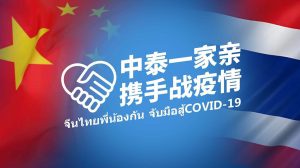On August 11, the Chinese Embassy in Bangkok formally introduced Han Zhiqiang, 58, as the new Chinese ambassador to Thailand. At first glance, this looks like a fairly innocuous piece of news. But this development needs to be watched closely, considering that Han Zhiqiang’s appointment brings to an end the nearly two years in which China has been without a formal ambassador to Thailand.
Former ambassador Liu Jian reportedly left Thailand in December 2019, citing health reasons for his sudden departure. Since then, charge d’affaires Yang Xin had stepped in as acting Chinese ambassador. With his deep understanding of Thailand and the ability to communicate fluently in Thai, Yang Xin has maintained a highly visible presence. He has been featured in several media channels with good public exposure, including a popular Thai PBS debate show and Suthichai Yoon’s fast-growing podcast.
Still, the absence of a Chinese ambassador raised questions about cracks in the Sino-Thai friendship, which has blossomed since the 2014 Thai coup. One popular theory is that the delayed appointment reflects Beijing’s irritation with Bangkok for giving Washington a green light to build a new U.S. consulate in Chiang Mai, a northern Thai province lying in close proximity to China’s southern border.
The construction of the consulate, expected to be completed by 2023, will costs roughly $284 million. Observers, including Sondhi Limthongkul and Jatuporn Prompan, well-known figures from opposing political camps, point out that Washington’s investment is suspiciously large. It appears that Washington is seeking to use Chiang Mai as a base from which to spy on southern Chinese provinces amid escalating strategic competition between the two superpowers.
Unlike military leaders in the Thai government who are depicted as pro-China, Foreign Minister Don Pramudwinai – an alumnus of Tufts University – is said to be overtly pro-U.S. This perception became widespread following the minister’s dangerous remark that Washington alerted Bangkok “one day in advance” of its assassination of Iranian general Qasem Soleimani last year.
The public speculation that Thailand has adopted a more pro-U.S. stance prompted the Ministry of Foreign Affairs (MFA) to issue a statement in June of this year, insisting that Thailand’s foreign policy approach is to maintain a balanced position between the U.S. and China.
Ambassador Han Zhiqiang landed in Bangkok two months after the MFA’s statement. In his first message, the new ambassador stressed the notion of China and Thailand as “one family” and pledged to give Thailand “unconditional support” to fight the COVID-19 pandemic.
On one hand, Han’s long-awaited arrival has alleviated rumors about the icy China-Thailand relationship. But on the other hand, the timing of his arrival and his diplomatic background reinforce the idea that Thailand is slipping out of China’s grip and needs to be put back in its place.
First, the presence of Western powers is growing in Thailand and their roles are likely to pose a threat to China’s interests. The U.S. under the Biden administration is ramping up its vaccine diplomacy efforts. Things are working in Washington’s favor because Thais generally see U.S.-produced mRNA vaccines, those manufactured by Pfizer and Moderna, as the most desirable COVID-19 vaccines. Moreover, much to China’s annoyance, the U.S. has started employing the term “free and open Mekong” to refer to mainland Southeast Asia as well as encouraging ASEAN nations including Thailand to play a leading role in addressing security issues linked to Chinese dams on the upper reaches of the Mekong.
Meanwhile, post-Brexit Britain is pushing for its own “pivot to Asia.” On July 24, Thailand engaged in a naval exercise with the U.K. for the first time since the 2014 coup. Although Thailand insisted that this was a passing exercise with no militaristic intentions, China has reasons to be skeptical since the vessel HMS Richmond, which was involved in the drill, is part of Britain’s Carrier Strike Group on a power projection mission seemingly aimed at countering China’s rising influence. Additionally, the joint exercise occurred shortly after Thailand once again postponed submarine purchases from China.
Second, Han has years of experience in Japan – a high priority country for China. Notably, he was an acting ambassador when the risk of confrontation between China and Japan rose sharply over the disputed Diaoyu/Senkaku Islands. The Sino-Japanese relationship – commonly labelled as “hot economics, cold politics” – is undoubtedly one of the world’s most complex bilateral relationships. The fact that Han was assigned to such an important role indicates that he is a highly skilled diplomat, particularly at conflict management.
Taking these signals and Thailand’s rising domestic challenges into account, it is safe to say that the increasingly vulnerable Thailand will face a tougher task of trying to maintain an equilibrium between China and the West.
































